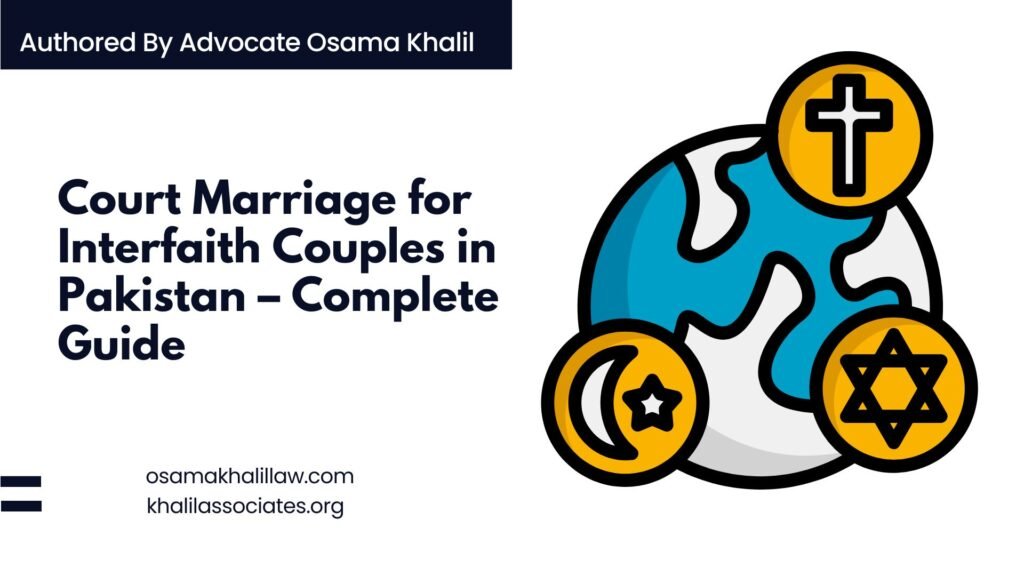
In Pakistan, many couples from different religions wish to marry but face social and legal challenges. However, the law allows interfaith court marriage, providing a legal way for such couples to unite. This article explains everything about inter-religious marriage in Pakistan, including the process, documents, and legal protections.
What is Interfaith Court Marriage?
Interfaith court marriage refers to a legal union between a man and a woman belonging to different religions, registered under the law. Unlike traditional weddings, a cross-faith marriage does not require religious ceremonies. Instead, the couple registers their marriage in court, ensuring legal recognition.
Legal Basis for Interfaith Marriage in Pakistan
Pakistan’s legal system permits interfaith unions under specific laws. The main laws governing mixed marriages include:
The Muslim Family Laws Ordinance 1961
This law applies if one partner is Muslim. It sets rules for marriage registration and divorce procedures.
The Christian Marriage Act 1872
This law governs marriages where at least one partner is Christian.
The Special Marriage Act 1872
This law allows inter-religious marriage registration for couples who do not follow the same faith.
Why Choose Court Marriage for Interfaith Couples?
Many couples prefer interfaith court marriage because it provides legal security. Here are some key benefits:
Legal Recognition
A registered cross-faith marriage is valid in court, protecting both partners’ rights.
Avoiding Family Pressure
Some families oppose mixed marriages, so court registration ensures the union is legally binding without family interference.
Simplifying Documentation
A court-registered interfaith union makes it easier to obtain visas, passports, and other legal documents.
Requirements for Interfaith Court Marriage in Pakistan
To register an inter-religious marriage, couples must meet certain conditions:
Age Requirement
The groom must be at least 18, and the bride must be at least 16. However, some provinces have higher age limits.
Consent of Both Parties
Both partners must willingly agree to the interfaith court marriage without any force or fraud.
Witnesses
At least two witnesses must be present during the court registration process.
Documentation
Couples must submit the following documents:
- CNIC copies of both partners
- Two passport-sized photographs
- Affidavit of free will
- Divorce or death certificate (if previously married)
Step-by-Step Process of Interfaith Court Marriage
The process for interfaith court marriage involves several steps:
Step 1: Submission of Application
The couple submits a marriage application to the relevant court or marriage registrar.
Step 2: Notice Publication
The court publishes a public notice for 30 days to invite any objections.
Step 3: Objection Handling
If someone objects, the court hears the case before proceeding.
Step 4: Marriage Registration
If no objections arise, the court solemnizes the inter-religious marriage and issues a marriage certificate.
Challenges Faced by Interfaith Couples in Pakistan
Despite legal provisions, mixed marriages often face difficulties:
Social Stigma
Many communities disapprove of cross-faith marriages, leading to family disputes.
Legal Delays
Some courts delay interfaith union registrations due to bureaucratic hurdles.
Religious Restrictions
Certain religious groups discourage inter-religious marriage, creating additional pressure.
How to Overcome Challenges in Interfaith Marriage
Couples can take these steps to ensure a smooth interfaith court marriage:
Hiring a Lawyer
A family lawyer can help navigate legal complexities and speed up the process.
Keeping Documents Ready
Having all required paperwork reduces delays in interfaith union registration.
Seeking Support
Some NGOs and legal aid groups assist couples in mixed marriages.
Rights of Interfaith Couples After Marriage
Once registered, court marriage grants several rights:
Inheritance Rights
The spouse can claim inheritance as per Pakistani law.
Child Custody
Both parents have legal rights over their children.
Divorce Procedures
If the marriage ends, divorce follows the legal process applicable to their inter-religious marriage.
Frequently Asked Questions (FAQs)
Can a Muslim marry a non-Muslim in Pakistan?
Yes, a Muslim man can marry a Christian or Jewish woman, but a Muslim woman faces restrictions in interfaith unions.
Is court marriage valid for interfaith couples?
Yes, interfaith court marriage is legally valid if registered properly.
How long does the court marriage process take?
Typically, it takes 30-60 days, depending on objections and court procedures.
Conclusion
Interfaith court marriage in Pakistan offers a legal pathway for couples of different religions to marry. Despite social and legal challenges, understanding the process helps couples secure their rights. By following the correct steps and seeking legal assistance, mixed marriage couples can ensure a smooth and recognized union.
Legal Assistance
For professional legal guidance and support in immigration matters, you may contact:
Mr. Osama Khalil
Lawyer & Legal Consultant
📞 Phone: 0316-1829946
📧 Email: contact@osamakhalillaw.com | contact@khalilassociates.org
